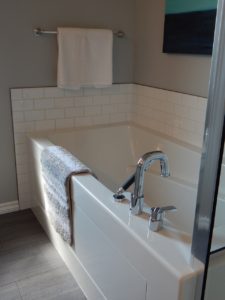Save Big by Wasting Less- Simple Tips for Hot Water Efficiency
 Now that there’s a chill in the air, many of us are taking longer, hotter showers…but in the process, all that hot water (and money) is literally going down the drain. According to energy.gov, water heating is the second largest energy expense in a home (after heating and cooling), accounting for 12-18% of all utility bills. And since New Jersey has among the highest household energy expenditures in the country, it’s time to start finding ways to save through things like managing hot water efficiency in the home.
Now that there’s a chill in the air, many of us are taking longer, hotter showers…but in the process, all that hot water (and money) is literally going down the drain. According to energy.gov, water heating is the second largest energy expense in a home (after heating and cooling), accounting for 12-18% of all utility bills. And since New Jersey has among the highest household energy expenditures in the country, it’s time to start finding ways to save through things like managing hot water efficiency in the home.
Biggest Hot Water Efficiency Wasters
Contents
Faucets and appliances can be big hot water wasters if you’re not careful. On average, the typical New Jersey home uses 64 gallons of water daily:
- Clothing Washer: 25 gallons per use
- Shower: 10 gallons per use
- Dishwasher: 6 gallons per use
- Kitchen & Bathroom Faucet Flow: 2 gallons per minute each
Simple Hot Water Efficiency Tips
From no-cost changes and low-cost improvements to large-scale investments, you can start saving today:
- Shorten shower time- Take less time in the shower.
- Turn off the faucet- When you’re brushing your teeth or washing dishes, turn it off.
- Wash only full loads- Choose shorter cycles and wash only full laundry and dishwasher loads.
- Fix leaky faucets- Leaky faucets and showerheads can account for an average 3,153 gallons of water wasted per year.
- Install low-flow- Federal regulations require new showerheads and faucets to have low flow rates which can save 25-60% than older models.
- Insulate hot-water storage tank- Just be careful not to cover the water heater’s top, bottom, thermostat or burner compartment.
- Upgrade appliances- ENERGY STAR says that over the life of an upgraded clothes washers and dish washer, you could save enough water to fill three backyard swimming pools.
- Lower water heater temperature* (see below)- You could save 3-5% on water heating costs!
A Few Degrees* Results in Big Energy Savings
For every 10 degrees you lower your temperature, you can save from 3-5% on energy costs based on two components: reduce standby losses (heat lost from water heater into surrounding basement area); and consumption (from water demand or use in your home).
According to the US Department of Energy, a temperature of 120 degrees at the tap is adequate for most household chores with a minimal danger of scalding and maximal energy efficiency. However, that is the temperature at the tap, not in the tank. Tank temperature should be no less than 130 degrees to prevent bacterial growth, such as Legionnaires disease. Note: If you have a suppressed immune system or chronic respiratory disease, you may consider keeping your hot water tank at 140ºF.
Lowering the temperature any more than 120 degrees can have unintended consequences. You may end up using more heated water than necessary to obtain the same temperature at the faucet or shower. So, if your tank currently gives your family three hot showers every morning and you lower the temp, the last person might be left chilled and screaming!
Want Hot Water Efficiency? Maintain Oil-Fired Boilers Regularly
With a high recovery rate of up to 120 gallons of hot water per hour, oil-fired boilers have gained popularity in recent years with those looking to make their homes greener. But they need to be maintained to do the job efficiently. To keep your system running as good as new, you’ll need to arrange for a routine boiler service to ensure it runs safely and effectively.
An annual inspection is the best way to save.
Not only that, but with routine service, your technician will check (and fix) any small faults that have the potential to develop into larger problems down the road.
Does your New Jersey home need furnace or boiler service to boost efficiency and hot water energy savings? With top-rated customer service and emergency service available 24/7, Point Bay is the most reliable Toms River heating and air conditioning company. Give us a call at (732) 349-5059.
